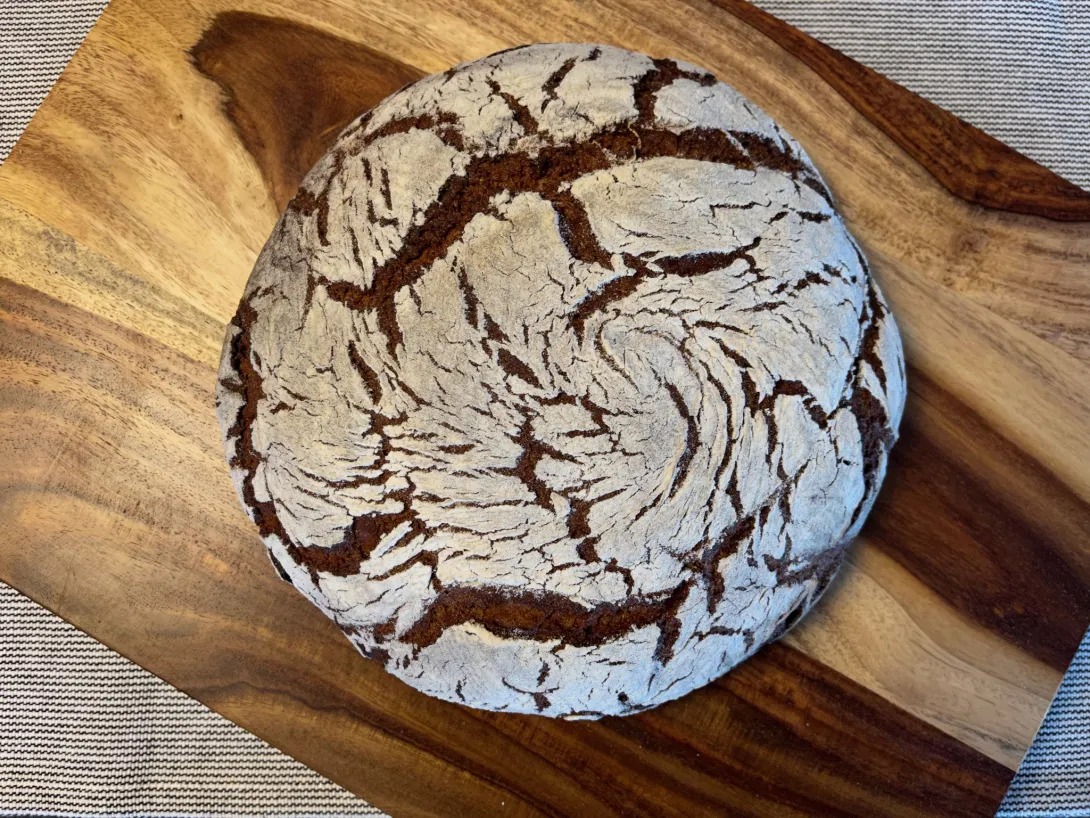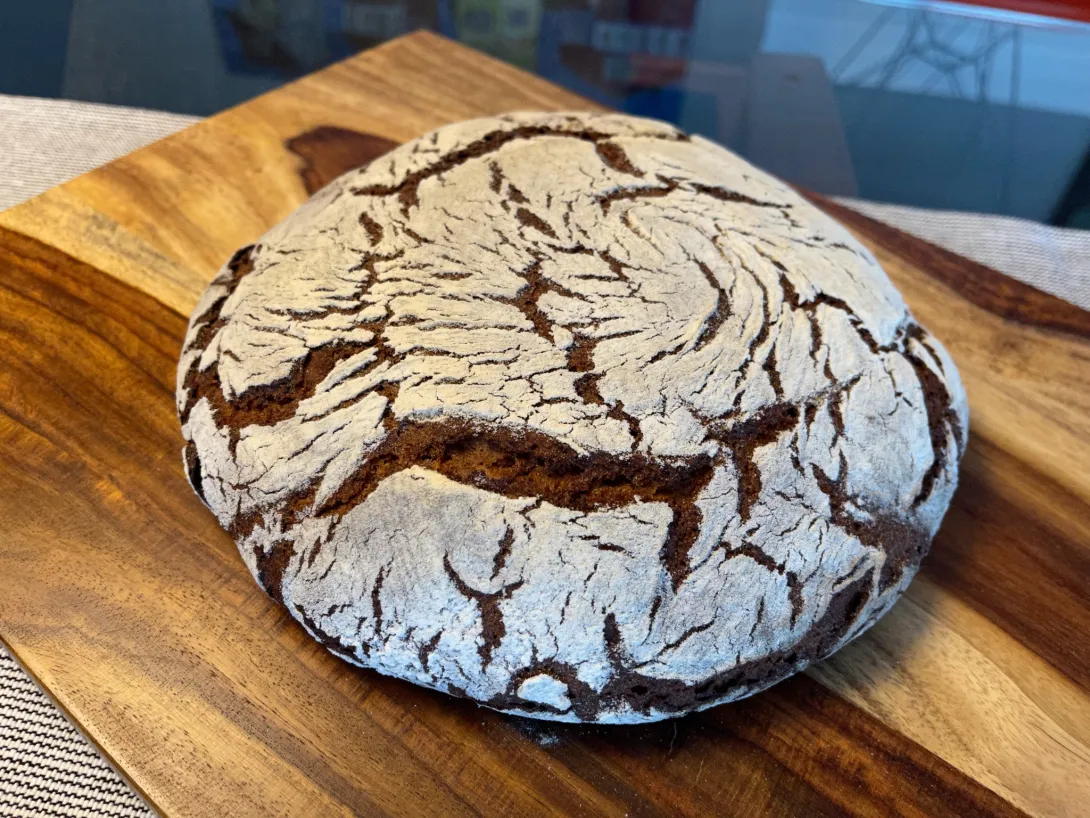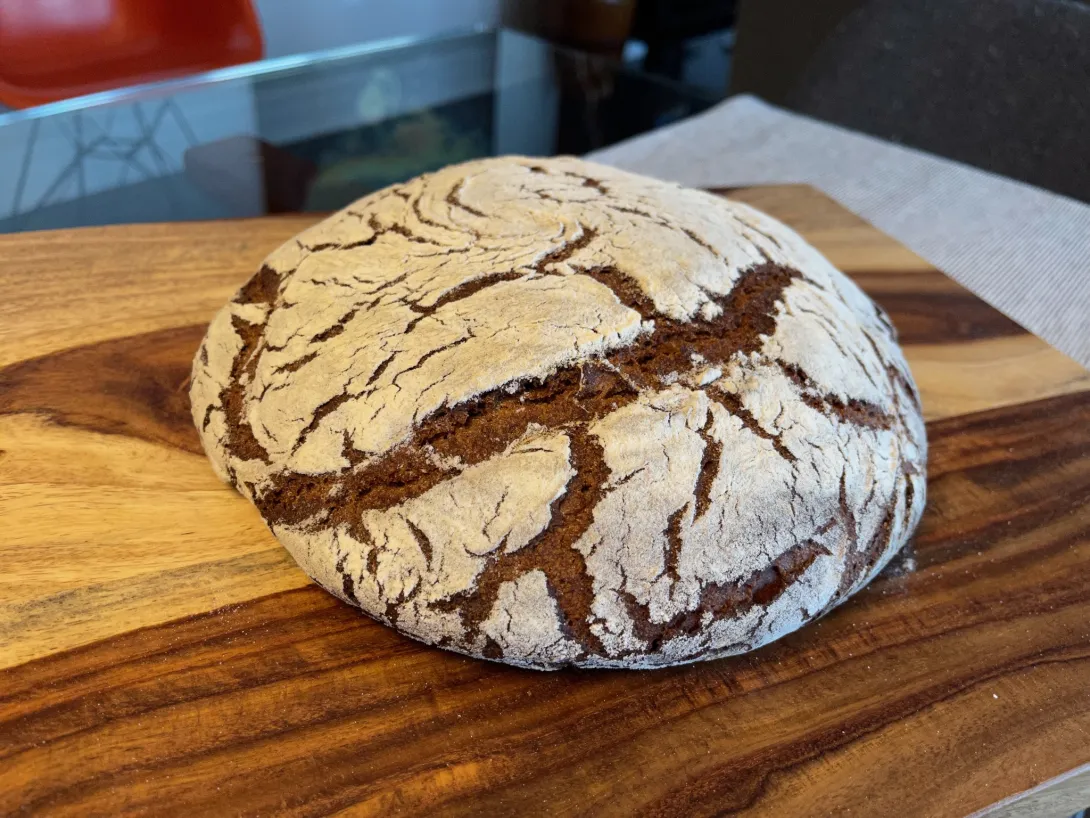Apparently this bread is also known as tourte Auvergnate. It is a 100% whole rye loaf and mine was made without any commercial yeast although I’ve seen recipes that use it in as a sponge along with the rye sour. Those who are familiar with baking rye sourdoughs know that they ferment very quickly. From building the first stage of the rye levain until the loaf is out of the oven only took 18 hours. However, you’re also likely aware that rye breads need time to “cure” after baking so I think they are best if you wait 24-48 hours before slicing. Based on my first bake of a 100% rye loaf I will wait 48 hours because I found that the rye flavour was more pronounced at 48 compared with 24 hours, and if you’re baking a 100% rye sourdough you want to taste the rye, no?
When recipes for rye say to flour the countertop or your hands, they do mean generously. At the time of shaping I didn’t have quite enough flour down and was getting a ton of sticking. Fortunately if you have your dough scraper handy, and of course you would, it is easy enough to get more flour under that sticky dough. I use the word shape loosely because really you’re molding the dough into a boule. Forget trying to create any tension, there isn’t the gluten of wheat in this dough so really you’re moulding it like clay.
| Rye %: | 100% |
|---|---|
| Stages: | Stage 1 sponge, Stage 2 sponge, Final dough |
| Leaven: | Rye sour culture |
| Start to Finish: | 14-16 hours |
| Hands-on Time: | 25-30 minutes |
| Yield: | Two 1¾ lb/800 g loave |
Stage 1 sponge (Day 1, Evening):
Ingredient Grams 2x800g loaves 1x900 g loaf (0.5625) Baker’s
Percentage
Wholegrain rye flour 118 66 g 100%
Warm (105°F/41°C) water 118 66 g 100%
Rye sour culture 14 8 g 12%
Mix the sponge ingredients by hand, cover and ferment at room temperature (70°F/21°C) overnight, 10-12 hours. The sponge will have tripled in volume and be very bubbly.
Stage 2 sponge (Day 2, Morning):
Ingredient Grams 2x800 g loaves 1x900 g loaf Baker’s
Percentage
Stage 1 sponge 250 140 g 100%
Wholegrain rye flour 250 140 g 100%
Warm (105°F/41°C) water 250 140 g 100%
Combine the Stage 1 sponge and the Stage 2 ingredients in the mixer bowl, cover and ferment at room temperature until the dough has visibly expanded and shows cracks or broken bubbles, 1½-2 hours.
Final Dough (Day 2, Midday):
| Ingredient | Grams 2x800 g | 1x940 g loaf |
|---|---|---|
| Stage 2 sponge | 750 | 420 g |
| Wholegrain rye flour | 500 | 281 g |
| Warm (105°F/41°C) water | 425 | 239 g |
| Salt | 10 | 5.625 |
Combine the Stage 1 sponge and the Stage 2 ingredients in the mixer bowl, cover and ferment at room temperature until the dough has visibly expanded and shows cracks or broken bubbles, 1½-2 hours.
Final Dough (Day 2, Midday):
| Ingredient | Grams 2x800 g | 1x940 g loaf |
|---|---|---|
| Stage 2 sponge | 750 | 420 g |
| Wholegrain rye flour | 500 | 281 g |
| Warm (105°F/41°C) water | 425 | 239 g |
| Salt | 10 | 5.625 |
In the mixer bowl, combine the final dough ingredients and use the dough hook at low (KA2) speed to mix until fully blended into a soft, sticky dough that gathers around the hook but doesn’t leave the sides of the bowl, 5-6 minutes.
Cover the bowl and ferment at room temperature until the dough doubles in volume and shows cracks or broken bubbles, 1½-2 hours.
Turn the dough onto a well-floured work surface. Use floured hands to gently shape into a boule, then place boule seam side up in a floured linen-lined banneton or cloth-lined proofing basket. Cover and proof at room temperature until the dough has visibly expanded and shows cracks or broken bubbles, 20-30 minutes.
Preheat the oven to 445°F/230°C with the baking surface in the middle. Turn the loaf onto a well-floured peel, if using a baking stone, or a parchment-lined sheet pan.
Bake without steam for 15 minutes, then lower the temperature to 430°F/220°C and bake for an additional 15 minutes. Reduce the temperature again to 390°F/200°C and bake until the loaves thump when tapped with a finger and the internal temperature is at least 200°F/93°C, 30-40 minutes. Transfer to a rack and cool thoroughly before slicing.



- Benito's Blog
- Log in or register to post comments
Hi Benny,
Your loaf looks just like the photo in the book, excellent work! I look forward to a crumb photo and a tasting note.
Tony
Hi Tony, thank you for the kind words. I will certainly post crumb photos and tasting notes on Sunday when I finally slice it. Fingers crossed that we’ll actually like the flavour of this loaf.
Benny
Excellent Benny, that does look great! Hope you get a good crumb!🤞
Thank you Ilya, I’ll cross my fingers too.
Excellent.
Here's the link to the formula at theryebaker.com blog:
http://theryebaker.com/sourdough-tourte-de-seigle
Thank you Dave, I hope we like the flavour of this. It certainly isn’t a lot of work to make that’s for sure.
Benny
Impressive. Nice work Benny.
Thank you Gavin, much appreciated.
Benny
Your loaf looks absolutely delicious. It has been a while since I've had a good rye.
Almost any amount of rye flour makes a dough incredibly sticky and 100% is especially so. I have found that it is too easy to add too much bench flour in order to combat the stickiness so I use damp (not wet) hands and a mist of water to the benchtop, instead, and a good bench scraper. It is tricky not to get too much water,also, and this handling method should be used only after the dough is already fully mixed. There is no gluten cloak to develop when shaping so your description of shaping the dough like clay is apropos. I've never used a banneton for proofing so my final shaping is on (or in) the baking pan. Corn meal, rolled oats or parchment keeps the loaf from sticking to the pan.
Yum! Would love to see a crumb shot, if the loaf is not already eaten.
We have yet to slice into the loaf, I am going to be patient and wait until tomorrow at lunch to have a slice.
Benny
I admire your commitment to 48 hours of anticipation. I baked my recent effort, detailed as a comment on Ilya's recent post, in Switzerland, where it was devoured by my extended family within 24 hours.
Rob
Thank you Rob. I’ll slice it in a few hours to have some for lunch, however, maybe dinner with smoked salmon and cream cheese might be better?
What’s the best way to eat this type of bread anyhow? Suggestions?
Benny
Schmear of cream cheese,lightly toasted with butter and honey, sharp cheese, smoked anything, lox, butter, or almost any way you can think of.
The taste of a well fermented and baked rye is sufficient unto itself. Enjoy!
would be traditional, but having none handy my Swiss family scarfed it down with well aged Gruyere. Fantastic. Smoked fish would do well, too. Or a creamy/tangy cheese. Or solo, perhaps paired with a crisp wine or beer. Enjoy it, Benny!
Well it has been sliced and I nibbled on a heel (end piece). Not my favourite loaf of bread but it’s fine. 100% rye might not be my thing, there is definitely a bit of a bitterness to this.
Now the crumb on the edges is cracked, I assume that is showing a bit of over fermentation? The recipe said to wait to bake until holes or cracks, I kept waiting for the cracks to appear all the while there were some holes, I should have baked but waited a bit longer. Anyhow, do you think the crumb shows over fermentation?
You sound disappointed, Benny. Don't be. That's a fine-looking bread.
Yes, those wider tunnels at the edges and slight bitter overtone perhaps do suggest overfermentation. On the ryebaker blog, people warned about over-proofing. On my first attempt, I went for 15 minutes. For last week's more successful bake, I probably only proofed for ten. Basically, the dough was already showing cracks before I proofed. So the proof was just to enforce the shape a bit.
The rye journey is long - and if you are contemplating a diff bake, can I go out on a limb and suggest HansJoakim's fave 70% rye, praised here by dmsnyder: https://www.thefreshloaf.com/node/13552/hansjoakim039s-favorite-70-sourdough-rye. I made it last week with whole rye to take on an alpine hike and it was scrumptious. The 30% wheat adds a bit more structure but the rye shines through gloriously.
Hi Rob, yes I’m a bit disappointed in a couple of things. Disappointed that I didn’t just follow Stanley’s time guidelines and allowed the dough to over ferment and also disappointed in the flavour. With wheat doughs we watch the dough and not the time, so I was following his times in general but not precisely. There are fewer clues to watch for with rye know when things are ready to go, that being said, he did say cracks or holes and my dough did have the holes just not cracks. I was hoping to enjoy the flavour of this loaf more than I do, there is a bit too much bitterness from the whole rye, I’m not sure that the bit of over fermentation would have caused that, I’m guessing it’s just the rye.
I may give a different recipe a try, but it can be a challenge finding a recipe for which I can find the right flours/ingredients. Essentially I haven’t found anything but whole rye flour where I’ve looked, no white/light rye, no rye chops etc. I haven’t given up on rye baking yet, I’ll try something again in the near future.
Thanks for your comments Rob, they are much appreciated.
Benny
where I live, the only places to find light & medium ryes are Polish groceries. I often make medium by mixing light & whole 50/50. And I've found I can sub whole rye in some medium rye recipes without too much fuss, though the density of the loaf does increase.
Also, there's a big diff in grinds, even of whole ryes. Most commercially available brands, including the organic ones, are ground quite fine -- while a NYS brand called Farmer Ground Flour is relatively coarse. I'm in Switzerland right now & all that's available is finely ground whole rye.
Rye baking is a great equalizer. I produce alot of tasty pancakes and misshapen loaves. And then -- epiphany out of a blue sky -- with the confluence of a stable oven w auto steam & my rye starter at a peak, I produce something that approaches beauty, like this 70% rye from two weeks ago, and I feel that all my failures and shortcomings are redeemed.
I've been inspired by your posts here on tfl, and I hope you continue your rye journey.
Rob
That is a beauty if I’ve ever seen one, very inspiring Rob. I never thought to look in Polish groceries, I’ll have to see if there are any in downtown Toronto that I can check out. Thanks for that suggestion and your comments on my baking, much appreciated.
Benny
rye flour in polish is maka zytnia. Type 750 would be light. Type 1800 or 2000 would be razowa, or whole grain.
Rob
Thanks for those translations as well Rob.